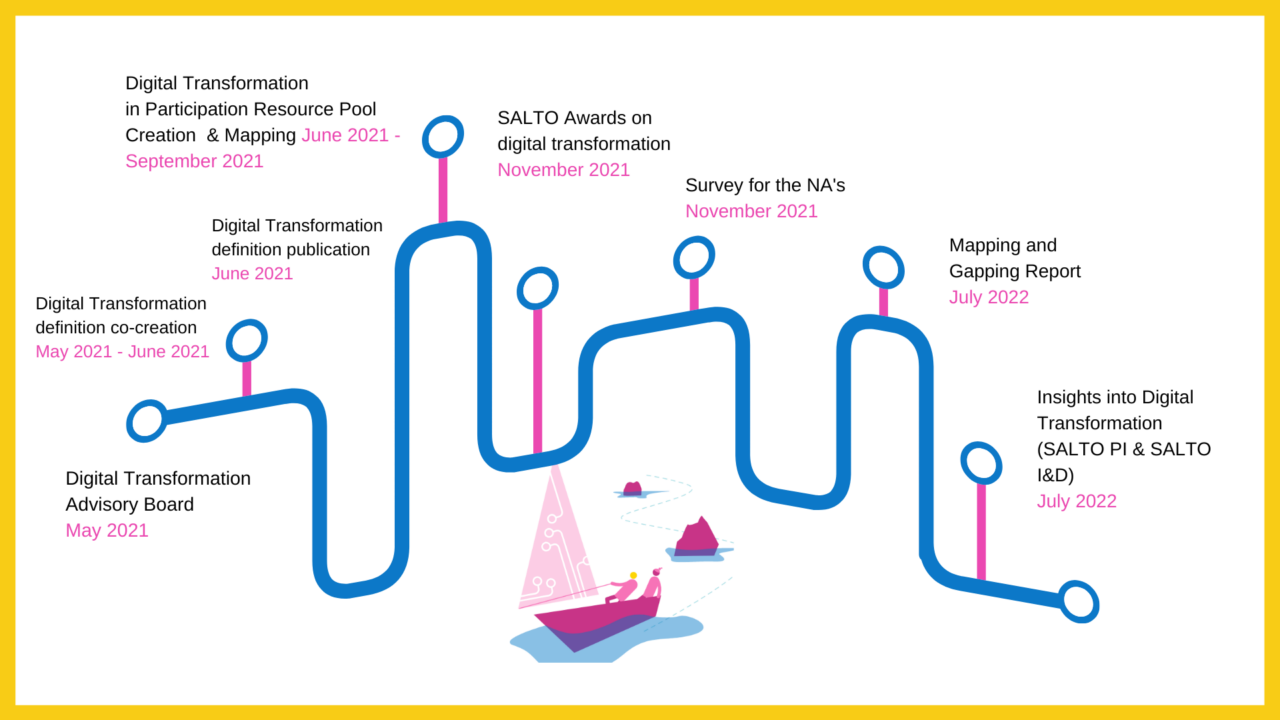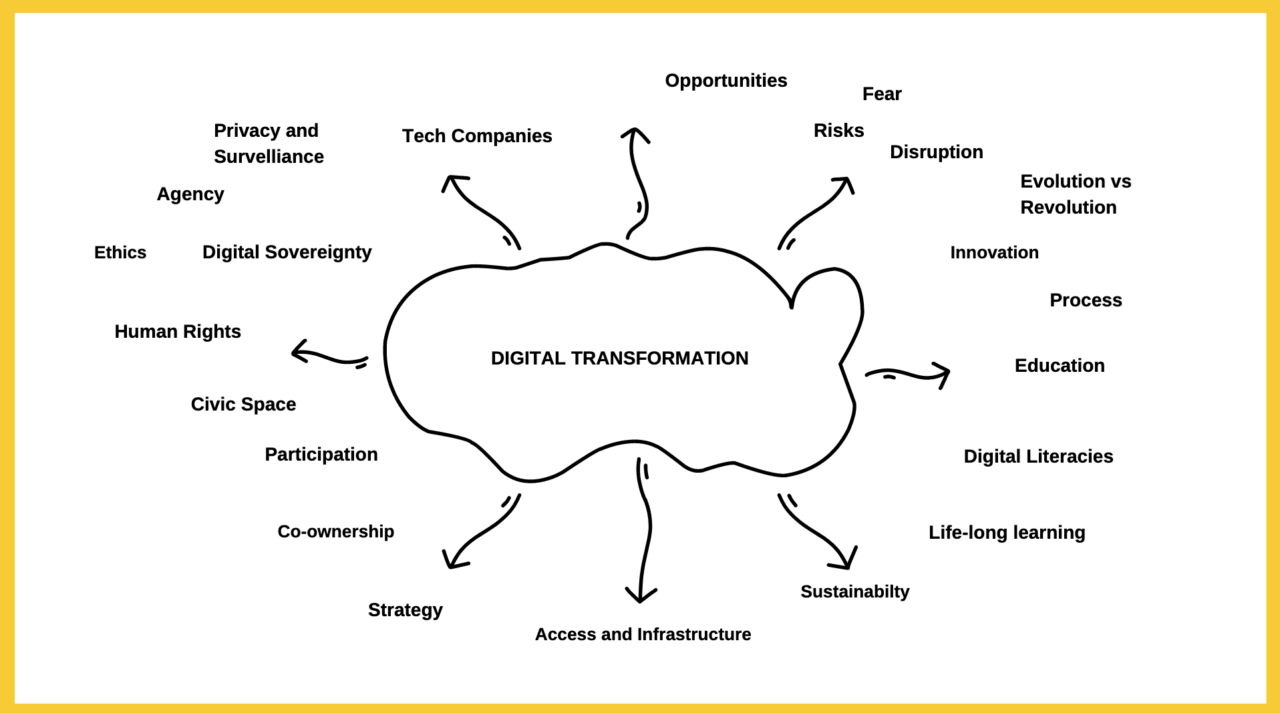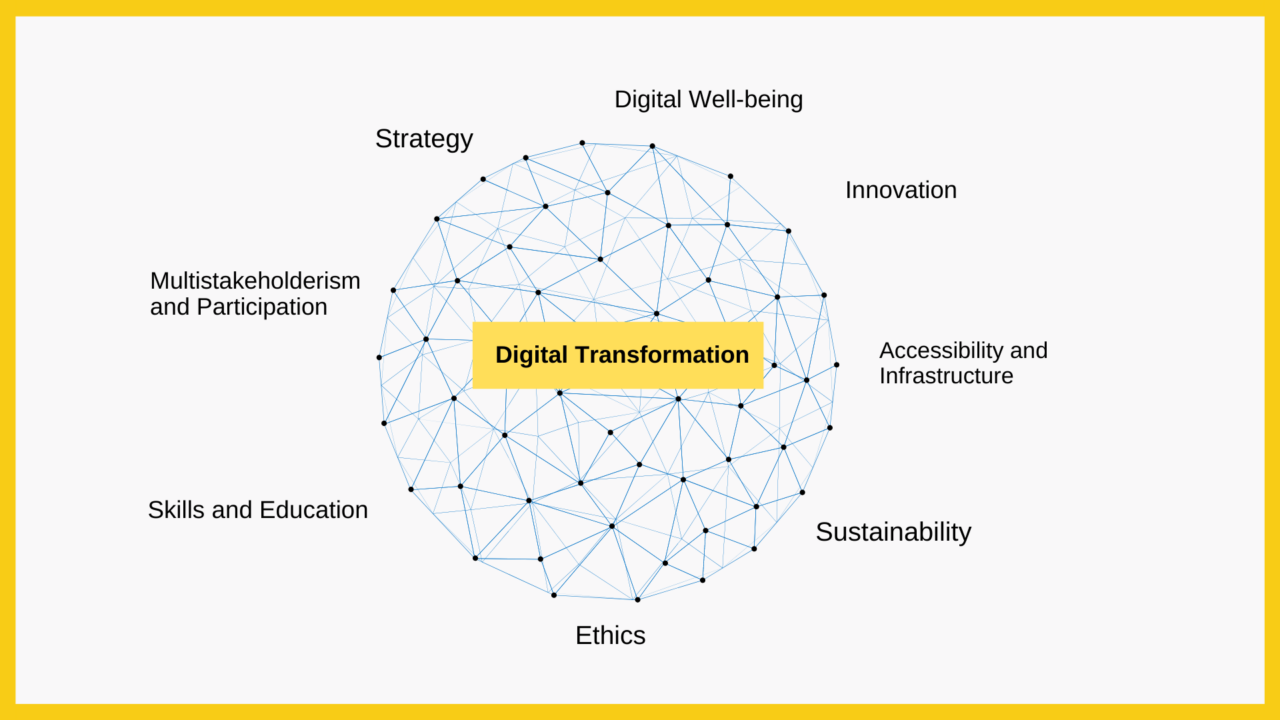Co-creation of youth-centred digital transformation: the story so far
Year of production: 2022
The timeline of the digital transformation activities
In 2021, SALTO Participation and Information Resource Centre (SALTO PI) embarked on the adventure of exploring the ins and outs of digital transformation in the European youth field. What is digital transformation? Why does it matter? And, how can we collaboratively define, understand and implement digital transformation in the European youth sector supported by the EU Youth Programmes (Erasmus+ and European Solidarity Corps)? These were some of the questions that led SALTO Participation and Information Resource Centre to a one-year project which aimed to answer these questions and ensure that digital transformation is a topic and a practice accessible to all.
Digital transformation is listed as one of the horizontal priorities in the EU Youth Programmes (Erasmus + and European Solidarity Corps) in the 2021-2027 programme period and is also one of the new priorities at the EU level. The European Commission’s top priority, ‘A Europe fit for the Digital Age’, emphasises the importance of embracing digital transformation. To achieve this, the European Commission highlights the need for investing in businesses, research and innovation, reforming data protection, empowering people with the skills necessary for a new generation of technologies, and drafting appropriate rules.

Digital transformation: demystifying and co-creating the meaning
What is digital transformation? To answer this question, we decided to analyse the existing literature on this topic and to co-examine the topic with the experts. The aim was to form an advisory board that offers a range of insights into how digital technologies continue to affect the European youth field. The call for the digital advisory was published in March 2021. In May 2021, experts from the field, such as digital & smart youth work, eParticipation, e-Governance, digital skills, digital inclusion, digital transformation, and EU policies (and more), joined the Digital Transformation Advisory Board. The final group was formed of experts and practitioners from the National Agencies to youth (work) organisations, academia, and the private sector.
The work of the Advisory Board on Digital Transformation aimed to build on the outcomes of previous initiatives and create synergies with existing policies and projects. Among them are the EU Youth Strategy, the Digital Education Action Plan, the Strategic National Agency Cooperation on Digital Youth Work, the work of RAY DIGI, as well as the work of other SALTO Resource Centres, such as SALTO Inclusion and Diversity and SALTO Training and Cooperation.
One of the key tasks for the group was to co-define the notion of digital transformation in the context of the EU Youth Programmes. Over a span of several meetings, the group mapped out their understanding of the digital transformation as well as challenges and opportunities related to the process. The co-creation process was led by Dr Alicja Pawluczuk, whose role was to facilitate the co-creation process and ground it in existing literature and research.
The discussion began by reflecting on what digital transformation means in the context of the European youth sector. Beginning with the findings in the literature, the advisory board built their collective understanding of the digital transformation as well as its associated risks and opportunities. The mapped-out topics (see Image 2) were related to the practical and strategic aspects of digital transformation implementation (e.g., the Internet connection, infrastructure, strategy, and disruption); the ethical considerations (e.g., agency, and human rights); the socio-political aspects (such as participation, and civic space); education, and many more.

Over the span of a few months, and after an impressive amount of mind-mapping exercises and lively discussions, the verdict was in – digital transformation is an incredibly complex phenomenon, although the creation of a shared understanding is possible. In July 2021, the values, experiences, and knowledge of the advisory board were translated into a new shiny definition for digital transformation in the European youth sector.
Digital transformation: definition
It is important to note that the purpose of our definition is not to identify all of these technological changes and the related challenges and opportunities – this would be an impossible task. Instead, we aimed to provide an open-ended and people-centred point of reference that ought to be situated in a specific context (e.g., cultural, technological, economic). With all of this in mind, the following short version definition is as follows:
In the European youth field, digital transformation is understood as a multi-stakeholder and inclusive process encompassing the co-design, implementation and utilisation of people-centred digital technologies with and by young people, youth workers and other relevant stakeholders. Digital transformation changes the way most areas of the youth field operate. Digital transformation describes the evolving integration of digital technologies into social, economic, and cultural processes and structures.
Digital transformation refers to both the practical changes in organisational functioning as well as the evolving cultural and social norms of society. The practical application of digital transformation might include the conversion or adaptation of traditional, non-digital and manual processes into digital processes (e.g., going paperless). The evolution of cultural and social norms can be seen in the way digital technologies influence, for example, modes of self-expression, communication and participation (e.g., the use of social media for youth-led campaigns/projects). Young people, youth workers and other relevant stakeholders require appropriate support (e.g., digital literacy education) in order to participate, benefit from, and contribute to digital transformation in Europe.
Digital transformation is a dynamic process, and thus its definition cannot be fixed or static. The fast-paced and disruptive nature of digital transformation means that most (if not all) areas of the youth field are impacted by the possible opportunities and challenges digital transformation might bring about. The characteristics of inclusive and sustainable digital transformation include:
- Multistakeholderism and participation
- Digital skills and education
- Access and infrastructure
- Strategy
- Innovation
- Sustainability
- Ethics
- Digital well-being
The full-length version of the framework can be found here.

Putting theory into practice: how can we make the topic of digital transformation more accessible in the European youth field?
The next stages of the project included grounding the framework into the European youth field and making sure that everyone has easy access to the definition as well as theoretical and practical resources related to digital transformation. In short, it was about putting theory into practice. To achieve this, the following activities and outputs were co-created:
1. Digital Transformation as a new topic in the SALTO Participation Resource Pool
To learn more about the digital transformation you can now dive into the Participation Resource Pool. The Pool provides information about the definition of digital transformation in the European youth field; resources and definitions related to the different digital transformation subtopics (e.g., digital education, and digital rights). The structure of the topics in The Pool was informed by the extended definition of digital transformation and its key areas of consideration, as well as discussions with the advisory group. It is important to note that just like the digital transformation itself, the resources are continually changing and growing to respond to the latest challenges and opportunities related to digital technology and the youth field. Currently, the Participation Resource Pool offers a range of resources which can be browsed and accessed here.
However, SALTO PI needs your support to make the resources better and up-to-date. That is why we invite you to submit your content ideas here. If you think you have come across an engaging article, video or any other relevant online content that may inspire youth participation or contribute to media literacy or digital transformation, let us know and we will do our best to give it the exposure it deserves.
2. Digital Transformation publications: what is coming this summer?
Report: Digital Transformation in the Youth Sector: Mapping and Gapping of Existing Resources
Our work with the new topic in the Participation Resource Pool also allowed us to map out and analyse existing resources (e.g., case studies, toolkits, and info libraries) related to digital transformation. The aim of the mapping exercise was to learn about the obstacles encountered by young people, youth workers and National Agencies in fostering digital transformation. The objective of the report was also to make the digital transformation topic more accessible in the youth field. The analysis also helped us to identify the gaps in the resources which might translate into training and information needs in the youth sector – and to use these insights in our future work. The report was made available in the summer of 2022.
Study: Insights into Digital Transformation in the Youth Field Supported by the EU Youth Programmes
To better understand the current understanding of digital transformation in the EU Youth Programmes, a collaborative effort between SALTO Participation & Information Resource Centre and SALTO Inclusion & Diversity Resource Centre was established at the beginning of 2021. The aim of the study was to learn from the E+ and ESC officers about their experiences with digital transformation and the types of support they need in this area of their work. The outcomes of the study have helped us to shed light on some of the issues and potential opportunities in the youth sector. The final report titled ‘Insights into digital transformation in the youth field supported by the EU Youth Programmes’ was published in the summer of 2022.
3. SALTO Awards 2021 on digital transformation.
In 2021, we also had an opportunity to learn about and celebrate incredible amounts of creativity and innovation in the youth sector. As part of the SALTO Awards 2021, the topic of digital transformation was added as a new category. Using the digital transformation framework we identified key characteristics of a successful youth-centred project covering the topic of digital transformation. The highlighted project provided inspiring examples of how technology can be used in an innovative way to drive innovation and social change. To learn about the winning project click here.
If you did not have a chance to participate in the competition last year, there is no reason to worry as we will be soon looking for nominations for the SALTO Awards 2022. Make sure you follow our social media for updates – you can pick from Instagram, Facebook, YouTube, and Twitter.
4. Long-term Training Course for Youth Workers: Digital Transformers
A journey to support digital transformation in practice. Advised by the above-mentioned reports and findings, a blended capacity building about digitally transforming youth work will take place from October 2022 to April 2023 where all of the topics from the digital transformation framework will be explored from a hands-on viewpoint – how can youth workers support young people in becoming the leaders in digital transformation.
5. Panel discussions on digital transformation
We see that digital transformation is best approached through a multi-stakeholder viewpoint. This is what we plan to share with anyone interested through open panel sessions taking place from September 2022 to April 2023, which will explore the digital transformation framework through different perspectives – academy, young people, youth workers, policymakers, etc. More information coming in August/September 2022. Keep yourself up-to-date by following SALTO PI social media and news.
6. Staff training for National Agencies
In a joint collaboration between SALTO PI and SALTO ID, the first staff training on digital transformation for National Agency officers will be launched in October 2022. The aims will be to enhance the understanding of the horizontal priority in the EU Youth Programmes: digital transformation, taking a look at it from a practical perspective and generally enhancing digital capacities within National Agencies.
Moving forward: let’s co-transform the digital transformation
When starting our work in 2021, the notion of digital transformation felt inaccessible, confusing, and mainly situated in the tech sector, academia, and policymakers. Is it possible to co-create a youth sector-centred vision of digital transformation? Is it possible to co-define our own meaning of what digital transformation should mean in the context of the lives of young people? How can we ensure that digital transformation is co-driven by the youth sector? These were the questions driving our work at the very beginning. Looking back, it feels that a lot has been achieved when it comes to our understanding of digital transformation. We hope that the resources that have been co-created provide useful insights and a solid foundation for future work.
Moving forward, it is vital to keep the digital transformation conversation going in a meaningful and inclusive way. The initial steps to grasp our knowledge and practice in the context of digital transformation as a horizontal priority have been completed. However, with digital technologies continually developing, we need to prepare ourselves for ongoing work in this area. As we argued before, ‘You either hate it or you love it, but digital transformation is here to stay’. Therefore, future planning is crucial that all young people, youth workers, youth organisations and other stakeholders participate and benefit from digital transformation in Europe.
Would you like to explore digital transformation in European youth field further? Please find the links to each topic here:





